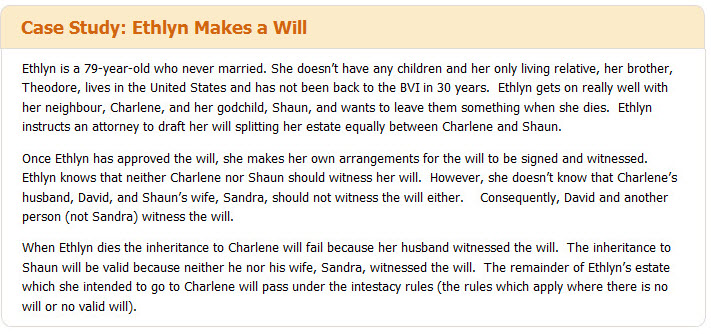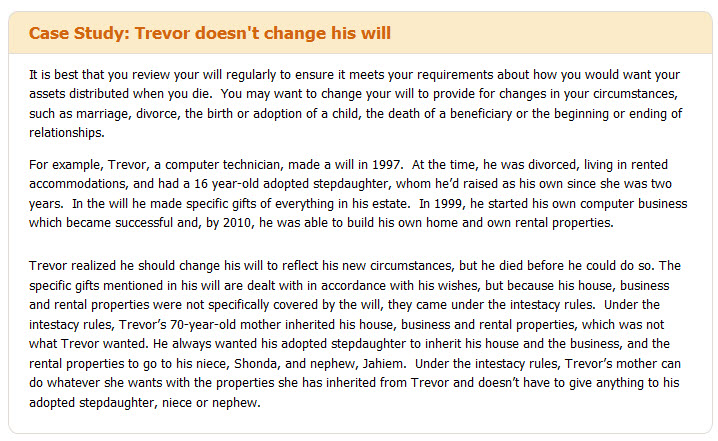Making a Will
When you die, you cannot take any of your earthly possessions with you. If you care about what will happen to all your belongings that you’ve worked hard to acquire, you should make a will. It’s the best way to make sure your estate is passed on to family and friends exactly as you wish. If you do not have a will, the House of Assembly may decide who gets your possessions, property and money. Who gets whatever you leave behind will be decided by the Intestates Estates Act, which sets out who will inherit your estate, according to a set priority, proportion and order. It doesn’t matter who was close to you or what you would have wanted. Even if you told your wishes to your family and friends; without a will, the law decides who gets what.
What is a will?
A will is a written document, called the testament, in which you, the testator, say how all your belongings will be shared out once you die.
Who can write a will?
According to the law, you must be 18 years or older and mentally capable for your will to be considered valid. You can get an attorney to prepare your will or you can prepare it yourself, but, for it to be valid, it must be witnessed. To avoid costly mistakes, it may be best to consider taking legal advice before doing it yourself.
What makes your will valid?
To be valid, your will must be signed by you or by someone you direct to sign on your behalf in your presence. Two or more competent persons, called witnesses, must be present at the same time that you or your designate sign your will. The witnesses must also sign in your presence to confirm that they saw the signing by you or the person signing on your behalf.
Who can be a witness for a will?
Any competent person can be a witness for your will. A witness, however, should not be a beneficiary or be married to a beneficiary of your will. If a witness is a beneficiary or married to a beneficiary of your will, your gift to that person or their spouse will not be valid and they will not receive the inheritance you wanted to leave for them. Although the will remains a valid and legal document, the gift to the beneficiary cannot be paid.

Can a will be changed?
You can change your will at any time by making a new will. You can also amend or add a supplement to your will, called a codicil, but this must be done in the same manner as a will. A codicil does not usually revoke the will but is read in conjunction with the will. A codicil is drawn up and executed in the same way as a will. It is possible to draw up your will to cover possible future events, such as marriage, divorce, a beneficiary dying before you, or to make gifts to children or grandchildren born after the date of the will.
How often should I change my will?
It is important to note that adopted children cannot inherit anything unless a will makes specific provision for them. If you have an adopted child and want him or her to inherit something from you, you must make a will.

Can a will be revoked or cancelled?
- If you write a new will, your old will is revoked or cancelled.
- If you declare in writing that you intend to revoke or cancel your will, then it will be done. This writing, however, must be done the same way as a will is done.
- If you want to cancel or revoke your will, you can burn, tear up or destroy it or have someone do so at your direction.
- If you get married, your will is automatically revoked or cancelled unless your will says it is not to be canceled or revoked on marriage.
Note, if you divorce, it will not revoke or cancel your will, but any reference to your former spouse will be treated as if he or she had died on the day that the decree absolute or final dissolution order was made.
When does your will become effective?
Your will goes into effect on your death.
Why write a will?
- You are living with a partner though you are not legally married and you wish your partner to inherit some or all of your estate.
- You are separated from your spouse but not yet divorced.
- You are legally married and have children and you wish your spouse to inherit all of your estate.
- You have no living relatives and wish to leave your estate to your friends.
- You are legally married and you don’t wish your spouse to inherit anything.
- You are legally married but have no children.
- You are legally married and have children from a previous relationship or out of wedlock and you wish to ensure that your children receive something from your estate.
- You have adopted a child and you would like that child to share in your estate.
- You would like to provide for the children of a son or daughter who predeceased you.
- You have dependant relatives, e.g. children under 18, elderly relatives or relatives with a disability, who have special needs and you want to make sure they are looked after and provided for. (If you make a will you can appoint guardians to look after your children and set up trusts in your will to provide for dependants.)
- You would like to leave some of your estate to friends or persons who are not members of your family.
What happens if your will is invalid?
If your will is deemed invalid for any reason, it will be disregarded and your property will be distributed according to the intestacy laws.
Where should I keep my will?
Your will should be kept in a safe place and you should ensure that your executors know where to find it when you depart this life. You can store your will at your attorney’s office or you can keep it at your home. Wherever you keep your will, it is essential that it can be found when the time arrives.